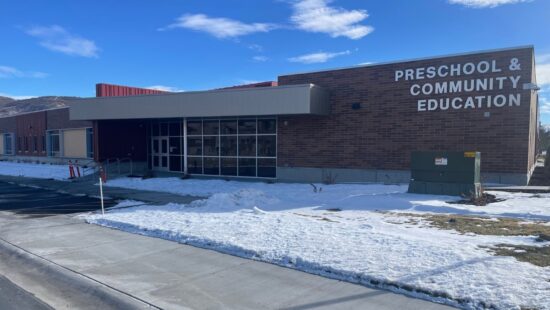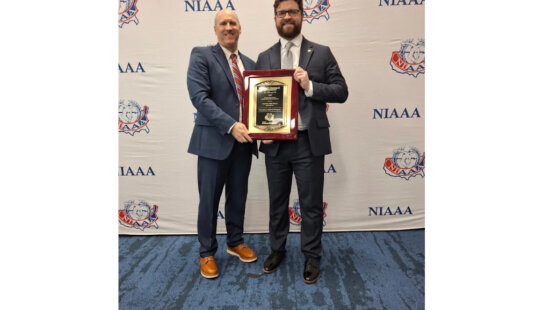Education
Park City High Principal calls for clear community stance against underage drinking

Photo: Photo by Rachel Coyne
PARK CITY, Utah — Park City High School Principal Caleb Fine is urging parents and community members to take a strong, united stance against underage drinking. Recent incidents during Homecoming week have highlighted what he describes as a dangerous cultural acceptance of this behavior.
In a letter to families, Fine pointed out a troubling trend: some parents believe that allowing teenagers to drink alcohol at home or on vacation is a safer option. “There is no safety in underage drinking,” Fine stated. “There is no evidence to suggest that alcohol consumption at an underage level is part of the solution.”
Local data further underscore his concerns. According to the 2023 SHARP Survey, 38.7% of 12th graders in Summit County reported drinking alcohol in the past 30 days. Among younger students, 11.2% of 10th graders, 6.7% of 8th graders, and only 0.4% of 6th graders reported alcohol use. Overall, 14% of Summit County students reported drinking in the past month, compared to just 3.4% statewide.
Fine noted that these figures reveal a cultural problem that must be addressed collectively. “This isn’t just a Park City issue. Adolescents across the country face temptation and experimentation with substances,” he said. “However, because of our access to alcohol and possibly some parents’ perceptions, it may be more prevalent here.”
He mentioned that several students were disciplined during Homecoming week for being under the influence of alcohol. “If multiple students are in trouble, it’s unlikely they are the only ones engaging in this behavior,” Fine remarked.
Park City High has implemented breathalyzer testing at school dances for nearly two decades — not as a punishment but as a form of prevention. “One reason we use breathalyzers is to give students as many reasons as possible to say no,” Fine explained. “We want a substance-free school and substance-free students.”
Protecting the Developing Brain
Pamella Bello, Director of Behavioral Health Prevention at the Summit County Health Department, said that beneath the statistics lies a critical medical reality: adolescent brains are still developing. “The brain isn’t fully developed until around age 25 or 26,” Bello said. “When youth drink, especially when they binge drink—and that’s typically how they drink—it damages the prefrontal cortex, which is responsible for judgment, and the hippocampus, which is essential for learning and memory.”
Research shows that youth who start drinking before age 15 are four times more likely to develop alcohol dependence later in life than those who wait until 21, Bello added. Studies also show smaller brain volume and impaired learning even when tested sober. “There’s lots of research showing how alcohol changes brain activity, kills neurons, and damages white matter,” Bello said. “That’s why we tell parents: protecting your child’s brain is the most important part.”
Bello said early communication is one of the strongest protective factors against youth alcohol use. “The American Academy of Pediatrics recommends starting the conversation about alcohol around age nine,” she said. “Between 9 and 13, kids already begin forming their opinions about drinking. You want them to get the right information from you—not from friends or the internet.”
The Power of a Clear ‘No’
Fine and Bello agree that parents play the most powerful role in prevention. “If parents say, ‘You can do it safely,’ they’ve given a green light,” Fine said. “Even if it turns out okay for their child, they’ve impacted the community, because you don’t know how your child’s consumption affects the next kid down the street.”
Bello said research consistently supports that message. “When parents clearly say alcohol is not allowed, teens are far less likely to drink,” she said. “When parents send mixed messages—like saying, ‘You can try it when you’re 16’—that consistency is gone, and the risk goes up.”
Utah’s ParentsEmpowered.org campaign echoes those findings, reporting that parental disapproval is the No. 1 reason Utah kids choose not to drink. Bello said Summit County recently received a grant from the campaign to expand local prevention work and family-engagement programs.
She also offered practical steps: share at least five meals together a week to strengthen connection; talk often, not just once; and create an emergency code word so kids can ask to be picked up from uncomfortable situations without fear of punishment. “We need to have safe spaces for our kids to have fun without alcohol,” Bello said. “And as parents, we have to be involved in their world—play their video games, sit in their room while they’re getting ready, show up where they are. Teens still listen, even when they act like they don’t.”
A Shared Responsibility
Fine said the effort must extend beyond homes and schools. “It’s the parents, the school, and the greater community,” he said. “All three of us play a part in helping kids make healthy decisions.”
He said prevention will remain a focus across extracurriculars and classrooms. “It’s not a one-week or one-year thing. It never stops,” he said. “We’ve got to have that same approach with alcohol and drugs in general.”
For both leaders, the message is simple and urgent. “These kids are too valuable and too priceless to have any other stance,” Fine said. “Underage drinking is not a small thing—it’s a big thing, and we’ve got to care about it.”


















